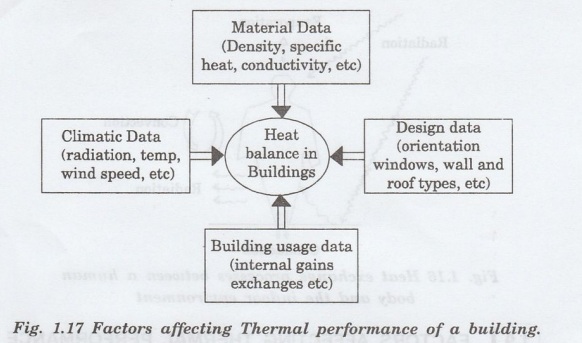Physics For Civil Engineering: Unit I: Thermal Application
Factors Affecting Thermal Performance of Buildings
There are a number of factors which affects the thermal alvani edi performance of buildings.
FACTORS AFFECTING THERMAL PERFORMANCE OF
BUILDINGS
There are a number of factors which
affects the thermal alvani edi performance of buildings.
(i) The main factor is the insulation
value of the materials used in the building (i.e., floors, walls roof). This
value is known as the U- value of the material. If the material has low U -
value, then the building will have good thermal performance.
(ii) Design variables (geometrical dimensions of building elements such
as walls, roof and windows, orientation, shading devices, etc.)
(iii) Material properties (density, specific heat, thermal conductivity,
transmissivity, etc.)
(iv) Climate data (solar radiation, ambient lamp, wind speed, humidity,
etc.)
(v) A building's usage data (internal gains due to Iliw dead occupants lighting and
equipment, etc.)
A block diagram showing various factors
affecting the heat balance of a building is given in fig. 1.17.

Note:
-U - values are a true reflection of the thermal
performance only when the insulation is fitted correctly.
If it isn't fitted correctly and an air gap is formed then
the performance of the structure is drastically affected.
Physics For Civil Engineering: Unit I: Thermal Application : Tag: : - Factors Affecting Thermal Performance of Buildings
Related Topics
Related Subjects
Physics for Civil Engineering
PH3201 2021 Regulation | 2nd Semester Civil Dept 2021 Regulation
